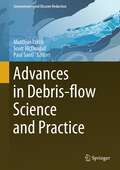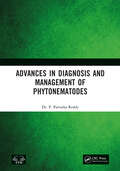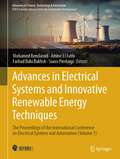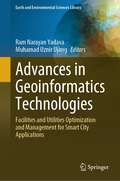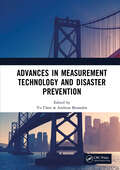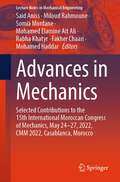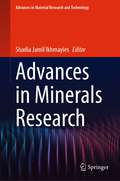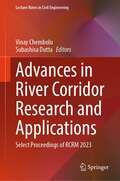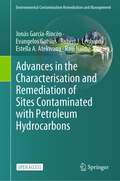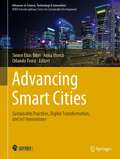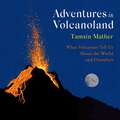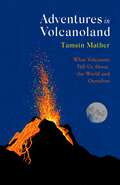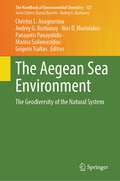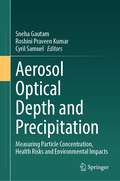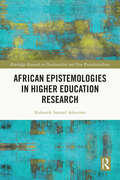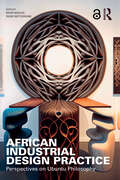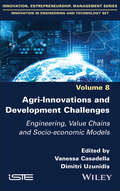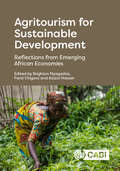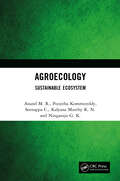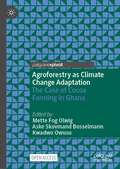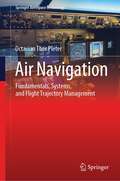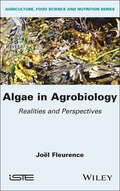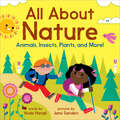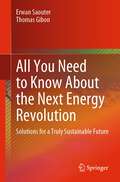- Table View
- List View
Advances in Debris-flow Science and Practice (Geoenvironmental Disaster Reduction)
by Matthias Jakob Scott McDougall Paul SantiThis book provides a summary of the state of the art of all facets of debris-flow science and practice and is designed to be a comprehensive technical reference for practitioners and a state-of-the-art research overview for scientists. It is richly illustrated with equations, graphs, photos, and tables. The book allows students, practitioners, and regulators to get a sense of the current state of the art in this science. Currently, there are 2 to 3 papers published every week on some aspects of debris-flow science. This creates a bewildering amount of literature that cannot be captured by a single individual. This book provides a comprehensive overview of all facets to date, including initial hazard assessments, detailed quantitative risk assessments, debris-flow warning systems, debris-flow mitigation structure designs, and failures of mitigation works, as well as new topics such as climate change effects on debris flows.
Advances in Diagnosis and Management of Phytonematodes
by P. Parvatha ReddyAdvances in Diagnosis and Management of Phytonematodes provides information on various aspects of diagnosis and eco-friendly nematode management. It explains at length nematode diagnosis—morphological, biochemical and molecular—and management strategies—regulatory, physical, cultural, chemical, biological, host resistance and integrated management methods. This book will be of immense value to the scientific community involved in teaching, research and extension activities related to the diagnosis and management of phytonematodes. It is suitable for teaching both undergraduate and postgraduate courses in the field of plant protection. It can also serve as an advantageous reference to policymakers and practicing farmers. Print edition not for sale in India.
Advances in Electrical Systems and Innovative Renewable Energy Techniques: The Proceedings of the International Conference on Electrical Systems and Automation (Volume 1) (Advances in Science, Technology & Innovation)
by Mohamed Bendaoud Amine El Fathi Farhad Ilahi Bakhsh Siano PierluigiThis edited book on “Advances in Electrical Systems and Innovative Renewable Energy Techniques” is an outcome of the selected papers presented at the International Conference on Electrical Systems & Automation, (ICESA 2023) held from 29 to 30, May 2023 at the Faculty of Sciences and technologies, Al Hoceïma, Morocco.This edited book is divided into 2 volumes. This volume will be divided into 3 parts, each devoted to distinct yet interconnected aspects of the subject matter.The first part focuses on various advancements in renewable energy techniques. It explores topics ranging from biomass combustion characteristics and hydrogen production using photovoltaics to the assessment of wave energy potential and the performance evaluation of solar collectors. These research papers not only shed light on the current state-of-the-art technologies but also offer valuable insights into their implementation, efficiency, and potential impact on the energy landscape.The second part focuses on interdisciplinary approaches between electrical and renewable energy systems and includes research chapters on photovoltaic (PV) energy, wind energy, and microgrid systems.For PV systems, several topics and issues are addressed such as modeling of PV systems using single diode model and double diode model; analytical and numerical methods for extraction of PV parameters; extraction of maximum power from PV system using integral SMC strategy, sun-pointing orientation, SuDoKu, and ANN algorithms; and fault detection and classification based on metaheuristic technique, and feedforward neural network.For the wind system, its modeling is first discussed, and then the control of the wind system using direct power, PI, fuzzy logic, sliding mode, and time delay strategies is analyzed.In the third part, the chapters focus on efficient energy management, optimization of microgrids, and the use of advancedtechnologies to improve energy performance. Researchers present innovative solutions to address the challenges of energy efficiency, grid responsiveness, and the integration of new energy sources.
Advances in Geoinformatics Technologies: Facilities and Utilities Optimization and Management for Smart City Applications (Earth and Environmental Sciences Library)
by Ram Narayan Yadava Muhamad Uznir UjangThere are many GIS products for smart cities to implement smart city projects or activities. Most of the Geoinformatics Technologies and its application books are theoretical and lack of examples with real world data and step by step explanations to understand the facilities and utilities optimization and management for smart city applications and socio-economic aspects.This book focuses and discusses topics related to how technological advances in Geoinformatics can help in the management operations of smart city applications to help our environment to be smart. Specifically, the volume focuses on how these advancements can help optimize and manage facilities and utilities. This book focuses on geoinformation modelling, geo-smart city applications, geoinformation technology, information system and computer science, and geolocation and positioning as its five primary areas of discussion. Each of these primary subjects delves into the application that uses geoinformatics technology in greater depth. This covers the use of Geoinformatics technology in the prevention of crime, coastal erosion, carbon emission modelling, landslide modelling, urban farming, and various other applications linked to the field. This book's objective is to provide a comprehensive review of the accomplishments that geoinformatics has made in a number of different application areas for smart cities. It covers Geoinformation Technologies, Geoinformation Modelling, Information System and Computer Science, Geolocation & Positioning, and Geo-Smart City Applications.The book will be useful to graduate students, university faculty, and researchers in Geoinformatics sciences/engineering and architecture and town planning. It will also be useful to entrepreneurs, professionals, and planners in policy and decision making at the local, state and national levels.
Advances in Measurement Technology and Disaster Prevention: Proceedings of the 4th International Conference on Measurement Technology, Disaster Prevention and Mitigation (MTDPM 2023), Nanjing, China, 26-28 May 2023
by Yu Chen Andreas BenardosAdvances in Measurement Technology and Disaster Prevention focuses on research of measurement technology and the development of disaster prevention and mitigation. The topics include: Measurement in Civil Engineering Disaster Prevention and Mitigation Hydraulic Engineering and Surveying Applications Protection Engineering The book will be of interest to professionals and academics in the above-mentioned areas.
Advances in Mechanics: Selected Contributions to the 15th International Moroccan Congress of Mechanics, May 24-27, 2022, CMM 2022, Casablanca, Morocco (Lecture Notes in Mechanical Engineering)
by Said Aniss Miloud Rahmoune Somia Mordane Mohamed Elamine Ait Ali Rabha Khatyr Fakher Chaari Mohamed HaddarThis book reports on innovative research in solid and fluid mechanics, and thermal engineering, giving a special emphasis on methods, modeling, and simulation tools for analyzing material behavior and energy systems. It gathers the best papers presented at 15th International Moroccan Congress of Mechanics "Congrès de Mécanique", CMM 2022, held on May 24-27, 2022, in Casablanca, Morocco, and organized by the Moroccan Society of Mechanics (SMSM) and the Faculty of Science Ain Chock of the University of Hassan II, Casablanca, Morocco. With a good balance of theory and practice, the book offers a timely snapshot of current advances in mechanics, and a source of inspiration for future research and international collaborations.
Advances in Minerals Research (Advances in Material Research and Technology)
by Shadia Jamil IkhmayiesThis book offers background material, reviews, and researched findings into the realms of minerals, mining, metallurgy, and engineering. Firstly, it elucidates fundamental mineral concepts, mining techniques, and mineral processing methods; secondly, it unveils cutting-edge insights on fine and coarse particle flotation, unveiling breakthrough technologies for enhanced efficiency; and thirdly, it explores the innovative applications of ultrasound and thermoluminescence in mineral processing, offering a holistic view of the latest advancements. This book sheds light on the versatile uses of silicones, the intricacies of bentonite clay, and the production pathways, properties, and applications of hydroxyapatite. Furthermore, the book provides invaluable insights into biomimetic biomineralization, the synthesis of low-carbon bio-cements, and the pioneering strides in mineral-based phase change materials.
Advances in River Corridor Research and Applications: Select Proceedings of RCRM 2023 (Lecture Notes in Civil Engineering #470)
by Vinay Chembolu Subashisa DuttaThis book presents the select proceedings of the 3rd International Conference on River Corridor Research and Management (RCRM 2023). It describes various topics on fluvio-hydro-ecological processes of river systems. The topics covered include river dynamics and morphological changes, river health and ecological aspects and satellite remote sensing for river corridor studies. The book also discusses the morphological behavior of gravel and sand-bed rivers, hydrological and hydraulics modeling and other important aspects of riverine ecology. The book will be a valuable reference for researchers and professionals working in the areas of river science.
Advances in the Characterisation and Remediation of Sites Contaminated with Petroleum Hydrocarbons (Environmental Contamination Remediation and Management)
by Jonás García-Rincón Evangelos Gatsios Robert J. Lenhard Estella A. Atekwana Ravi NaiduThis open access book synthesizes important advances in the assessment and management of soil and groundwater systems contaminated with petroleum hydrocarbons, especially in the form of light non-aqueous phase liquids (LNAPLs). LNAPL characterization and remediation is challenging due to the multi-phase, multi-component nature of the problem and the various physical, chemical, and biological processes involved in a dynamic and heterogeneous hydrogeological setting. This book focuses on the current state of practice of LNAPL characterization and remediation and seeks to provide information and a framework that would allow some of these complexities to be better addressed by contaminated land practitioners, researchers, and regulators.
Advancing Smart Cities: Sustainable Practices, Digital Transformation, and IoT Innovations (Advances in Science, Technology & Innovation)
by Simon Elias Bibri Anna Visvizi Orlando TroisiThis book presents a comprehensive exploration of the transformative journey toward smart cities and the implementation of cutting-edge technologies in urban development. Divided into four distinct parts, it covers a broad range of topics that contribute to sustainable, efficient, and innovative urban living. Encompassing diverse research from IEREK's Future Smart Cities (FSC) conference, it focuses on smart city advancement through sustainable practices, digital transformation, and IoT integration. Covering topics such as smart buildings, urban planning during pandemics, and IoT applications in health care and agriculture, this book shapes the future of urban living. It delves further into opportunities in city regeneration, human-centric smart design, IoT data effectiveness, and more. A valuable resource for academics, researchers, and policymakers, it offers insights into telecommunications, AI, smart manufacturing, and methodologies for urban ecosystem improvement.
Adventures in Volcanoland: What Volcanoes Tell Us About the World and Ourselves
by Tamsin MatherAdventures in Volcanoland charts journeys across deserts, through jungles and up ice caps, to some of the world's most important volcanoes, from Nicaragua to Hawaii, Santorini to Ethiopia, exploring Tamsin Mather's obsession with these momentous geological formations, the cultural and religious roles they have played in the minds of those living around them at different times throughout history, and the science behind their formation and eruptions.Volcanoes help to make and shape our world, bursting forth from inside of the earth and, in many places, looming over us. Present since the earth's beginning they continue to maintain its life support systems and, their extraordinary chemistry may even have created the ingredients needed for life to kick start.In some places volcanoes are even beginning to provide us with part of the energy we need to curb our use of fossil fuels. They have fascinated humans for millennia, their eruptions charted throughout history, seeming to show us how the earth has been living, breathing and changing for billions of years.Why exactly are these geological mammoths found where they are? What can they teach us about our environment, the Anthropocene and the ecological disaster that is climate change? Are there volcanoes on other planets, and what might they tell us about whether we could one day live there if we exhaust our own habitat? How can we predict if or when volcanoes might explode?Adventures in Volcanoland is an enthralling mix of travel, science and environmental writing for fans of Robert MacFarlane and Raynor Winn.
Adventures in Volcanoland: What Volcanoes Tell Us About the World and Ourselves
by Tamsin MatherAdventures in Volcanoland charts journeys across deserts, through jungles and up ice caps, to some of the world's most important volcanoes, from Nicaragua to Hawaii, Santorini to Ethiopia, exploring Tamsin Mather's obsession with these momentous geological formations, the cultural and religious roles they have played in the minds of those living around them at different times throughout history, and the science behind their formation and eruptions.Volcanoes help to make and shape our world, bursting forth from inside of the earth and, in many places, looming over us. Present since the earth's beginning they continue to maintain its life support systems and, their extraordinary chemistry may even have created the ingredients needed for life to kick start.In some places volcanoes are even beginning to provide us with part of the energy we need to curb our use of fossil fuels. They have fascinated humans for millennia, their eruptions charted throughout history, seeming to show us how the earth has been living, breathing and changing for billions of years.Why exactly are these geological mammoths found where they are? What can they teach us about our environment, the Anthropocene and the ecological disaster that is climate change? Are there volcanoes on other planets, and what might they tell us about whether we could one day live there if we exhaust our own habitat? How can we predict if or when volcanoes might explode?Adventures in Volcanoland is an enthralling mix of travel, science and environmental writing for fans of Robert MacFarlane and Raynor Winn.
The Aegean Sea Environment: The Geodiversity of the Natural System (The Handbook of Environmental Chemistry #127)
by Andrey G. Kostianoy Christos L. Anagnostou Ilias D. Mariolakos Panayotis Panayotidis Marina Soilemezidou Grigoris TsaltasThis is the first of three Books that together provide an integrated picture of the Aegean Sea, presenting the natural components of the system (Book I and Book II) as well as the human presence in the extended area (Book III). The Aegean Sea, also called Aegean Archipelagos, is an open, complex, and diverse marine system situated between the Black Sea and the Eastern Mediterranean, with different compartments and interactions. This book provides an in-depth exploration of the Aegean Sea's natural systems, shedding light on its geodiversity, geological dynamics, air-land-sea interaction, hydrology, suspended matter and sediments. Divided into 4 parts, the book introduces the diversity, geological dynamics, and evolution of the natural system of the Aegean Sea (Parts 1 and 2), followed by a section devoted to the land-sea interaction in the Aegean coastal system where experts in the field explore freshwater and matter inputs into the Aegean coastal system, as well as the coastal morphodynamics and evolution of the Aegean Sea, its adjacent land areas, and islands. In Part 3, the book delves into the air-sea interaction over the Aegean Sea, presenting its intricate dynamics, including heat and freshwater fluxes, wind waves, tides, and atmospheric deposition. The book closes with a section focused on the hydrology, chemistry, and dynamics of water masses and the sea bottom, providing insights into suspended matter and fluxes, sediments, climate changes, and the intricate nutrient and carbon dynamics within the Aegean Sea ecosystem (Part 4). Given the breadth and depth of its coverage, this book serves as a valuable resource for researchers, scholars, and students interested in marine geology, oceanography, and environmental analysis, as well as policymakers and conservationists seeking a comprehensive understanding of the Aegean Sea's complex natural systems.
Aerosol Optical Depth and Precipitation: Measuring Particle Concentration, Health Risks and Environmental Impacts
by Sneha Gautam Cyril Samuel Roshini Praveen KumarThis volume uses aerosol optical depth (AOD) analysis through mapping and remote sensing techniques to derive the relationship between aerosols and hazardous precipitation events, primarily in the form of flooding. Attention is also given to pollution caused by an abundance of particulate matter in the atmosphere and its impacts on human health, which is also assessed via the study of AOD. Background is given on how AOD is retrieved, and why it is a useful tool for estimating atmospheric particle concentration, but also the challenges associated with using this approach. Different aerosol types are introduced to perform a comparative analysis of the most common associations between pollution impacts on temperature and resulting precipitation events. These analyses will help to provide an overview of the best strategies to make informed and sustainable disaster risk management practices and policies. The target audience for the work is students, researchers, and scientists working witha vision towards sustainability, public health safety and air pollution mitigation measures. It will also be a useful text for climate change policy makers, environmental engineers and stakeholders in social development sectors.
African Epistemologies in Higher Education Research (Routledge Research on Decoloniality and New Postcolonialisms)
by Kolawole Samuel AdeyemoBringing a needed perspective on African Epistemologies on the critical topics of higher education in relation to knowledge systems, this book highlights how knowledge creation processes influence higher education systems, society, and African development. This book uses an interdisciplinary approach to frame the connections between academic knowledge systems. Specifically, it seeks to answer questions on the trends in knowledge mobility, histories, and sociological dimensions in knowledge production in post-colonial Africa. The discussion explores how existing knowledge systems can better align with past and present narratives throughout African history and philosophies. The primary thought behind this book is to deconstruct the idea of a free market, the issue of corruption, racism and the neoliberalist approach to knowledge creation and transmission. Thus, it seeks to answer questions on the history and sociological dimensions of knowledge production in higher education. The book argues that African epistemologies can be better understood by investigating present sociologies and histories shaping African higher education research. Researchers and university students in the field of sociology of education, economics of education, higher education and policy will find this book very useful.
African Industrial Design Practice: Perspectives on Ubuntu Philosophy
by Richie Moalosi Yaone RapitsenyaneThe underlying principle of this book is the African philosophy of Ubuntu, which acts as a guide for developing empathic products and services. The book makes the case that empathy is the key to any successful product and service design project because it enables designers to make wise design choices that align with users' demands. Fifteen chapters provide the latest industrial design developments, techniques, and processes explicitly targeting emerging economies. At the outset, it covers the design context and the philosophy of the Ubuntu approach, which places people and communities at the centre of the development agenda. The book covers new product development, design research, design cognition, digital and traditional prototyping, bringing products to the market, establishing a company's brand name, intellectual property rights, traditional knowledge, and the business case for design in Afrika. It concludes with a discussion about the future of design and the skills aspiring designers will need. African Industrial Design Practice: Perspectives on Ubuntu Philosophy will be an essential textbook for undergraduates, postgraduates, instructors, and beginner designers in emerging economies to provide regionally contextualised design processes, illustrated examples, and outcomes.
African Industrial Design Practice: Perspectives on Ubuntu Philosophy
by Richie Moalosi Yaone RapitsenyaneThe underlying principle of this book is the African philosophy of Ubuntu, which acts as a guide for developing empathic products and services. The book makes the case that empathy is the key to any successful product and service design project because it enables designers to make wise design choices that align with users' demands.Fifteen chapters provide the latest industrial design developments, techniques, and processes explicitly targeting emerging economies. At the outset, it covers the design context and the philosophy of the Ubuntu approach, which places people and communities at the centre of the development agenda. The book covers new product development, design research, design cognition, digital and traditional prototyping, bringing products to the market, establishing a company's brand name, intellectual property rights, traditional knowledge, and the business case for design in Afrika. It concludes with a discussion about the future of design and the skills aspiring designers will need.African Industrial Design Practice: Perspectives on Ubuntu Philosophy will be an essential textbook for undergraduates, postgraduates, instructors, and beginner designers in emerging economies to provide regionally contextualised design processes, illustrated examples, and outcomes.Chapter 2 of this book is freely available as a downloadable Open Access PDF at http://www.taylorfrancis.com under a Creative Commons Attribution-Non Commercial-No Derivatives (CC-BY-NC-ND) 4.0 license.
Agri-Innovations and Development Challenges: Engineering, Value Chains and Socio-economic Models
by Vanessa Casadella Dimitri UzunidisInnovation is a major challenge for economic development and social progress. Faced with the ecological and food problems that the world is currently experiencing, the legitimacy of innovation takes on its full meaning, particularly in developing countries. As emphasized by international organizations (UN, FAO), building skills and abilities in the agricultural and food sectors are necessary when launching innovation processes for the benefit of suffering populations. This book deals with different experiences launched in many developing countries in these sectors and shows how local initiatives can provide answers to the pessimism of experts and the media. Multidisciplinary analysis and practices explain how collective work creates value chains that can foster local and national economic development. The authors revisit the innovation agri-food models that contribute to economic development. Agri-Innovations and Development Challenges is composed of general presentations of innovations applied in developing countries, as well as specific studies on the joint valorization of knowledge and experience in agri-food engineering
Agritourism for Sustainable Development: Reflections from Emerging African Economies
by Admire Mthombeni Bronson Mutanda Collen Sabao Dumisani Rumbidzai Muzira Dzingai Kennedy Nyahunzvi Edward Chinongwa Enard Mutenheri Ernest Mugoni Felix Chari Geoffrey Korir Gilda Eyang Gracious Mutipforo Hellen Amunga Jabulani Garwi Judith Moyo Katsande Chipo Martin Dzapasi Noreen Watyoka Nyasha Tendai Makiwa Lucyna Przezborska-Skobiej Komborerai Wilfred Chikwape Obert Sifile Ranganayi Njodzi Raymond Mapuranga Regis Muchowe Samulo Mutale Sharon Chisango Shingirai Siziba Solomon Marime Tendai Shelton Muwani Tichakunda Valentine Chabata Willard Muntanga Yeukayi Dzapasi Zibanai ZhouThrough the lens of African emerging economies, this text examines empirical studies and the related practices of agritourism. By looking at tourism innovation, entrepreneurship ethics and responsibility of public and private organizational stakeholders, the text promotes an understanding of how radical novel sustainable agritourism might be implemented to help society's living become more sustainable with low usage of material resources, low energy and environmental cost. Informed by the 2030 Agenda for Sustainable Development and Sustainable Development Goals (SDGs) framework, which emphasize the fostering of novel sustainable agritourism, the book includes: methodologies, theory, reviews, primary research findings and practice topics such as start-ups, legal aspects, CSR and digital technologies techniques and tools with global application The book will be of interest to academics and postgraduate students interested in the challenges of sustainable agritourism and African emerging economies.
Agroecology: Sustainable Ecosystem
by Anand M. R. Poojitha Kommireddy Seenappa C. Kalyana Murthy K. N. Ningaraju G. K.Agroecology literacy is 'the degree to which people have an objective and well-informed understanding of crop production with environmental issues.' The increased food grain production has also increased the unscientific and indiscriminate use of agrochemicals which has affected the soil health and degraded agroecosystem adversely and brought down the immunity of soil and the productivity of crops. In addition, it has resulted in the over-exploitation of soil, leading to nutrient imbalance. Moreover, the negative impact of chemical agriculture on the environment and human health has been reported and documented. Increased environmental awareness and health consciousness promoted scientists and planners to think about sustainable farming practices as an alternate way for healthy agriculture to protect the environment and human health. Eco-friendly methods or ecosystem services are one solution to manage this issue. This book intends to provide the core elements of a curriculum for teaching agroecology at colleges and universities. Print edition not for sale in India.
Agroforestry as Climate Change Adaptation: The Case of Cocoa Farming in Ghana
by Mette Fog Olwig Aske Skovmand Bosselmann Kwadwo OwusuThis open access book provides multidisciplinary perspectives on the potential of agroforestry to mitigate the negative impacts of climate change on cocoa production. Against the backdrop of increasingly precarious farmer livelihoods, it focuses on cocoa-agroforestry in Ghana – the second largest producer of cocoa in the world. Taking the reader on a journey across experimental plots and on-farm studies, the book delivers a holistic understanding of cocoa-agroforestry. Chapters examine historical yield and climate interactions, the effects of heat and drought on cocoa plants and the role of differing shade trees on soil fertility, yields, pests and diseases. The book discusses the socioeconomics of shade tree management, including cost-benefits, tree rights and competition for natural resources emphasizing policy implications and recommendations.Taking a multidisciplinary approach to climate-agriculture interactions, the book provides an innovative understanding of agroforestry and perennial cropping systems that goes beyond the Ghanaian cocoa belt. It is of relevance to students, researchers, farmers, practitioners and policymakers working with agroforestry and climate change adaptation.This is an open access book.
Air Navigation: Fundamentals, Systems, and Flight Trajectory Management (Springer Aerospace Technology)
by Octavian Thor PleterThis book takes a new approach to air navigation, extending the classic scope of positioning and guidance to efficient and safe 4D flight trajectory management. Modern air navigation aims at flight trajectories optimisation. There is an infinite number of solutions to the classic navigation problem of flying from one airport to another, but most of them are wasteful of resources and even risky. Minimising all costs and risks incurred by the 4D flight trajectory makes air navigation both efficient and safe, which are key factors in air navigation services. Beyond minimising fuel burn and CO2, efficiency addresses non-CO2 emissions and noise. This is a visually intensive book, using examples and case studies to illustrate the concepts, the physics of navigation and the mathematical models involved. Numerical examples reflect its problem-solving nature. It is useful to aerospace students, engineers, pilots, air traffic controllers, technicians, and scientists curious about aviation.
Algae in Agrobiology: Realities and Perspectives
by Joel FleurenceAlgae, macroalgae and microalgae can be valuable biological resources in a new, more environmentally friendly form of agriculture known as agrobiology. Indeed, the biological properties associated with algae are frequently relevant for agricultural and zootechnical purposes. It is this aspect that is behind the current popularity of algae in the development of new agricultural practices that are related to plant and animal production, which are referred to as agrobiology. Algae in Agrobiology offers a current and forward-looking account of algae use: in agriculture and in the sector of land and marine animal production, as algal extracts and molecules in the form of fertilizers or biostimulants for crops with agronomic interest, and as algal compounds in the area of plant and animal health. This book is based on advances in biochemical and agronomic research in order to explain the conventional practices associated with the use of algae in agriculture and livestock breeding. These advances make it possible to establish possible uses for marine algal resources in the agriculture of the future.
All About Nature: Animals, Insects, Plants, and More! (The\all About Picture Book Ser.)
by Huda HarajliDiscover the world outside—an introduction to nature for kids ages 3 to 5Can you feel the sun? Hear the birds singing? See colorful leaves on the trees? That's nature! This picture book of fun facts teaches toddlers all about land, water, air, and critters big and small. Watch them discover their inner explorer as they look for different kinds of rocks, spot stars in the sky, and learn to love the great outdoors.Our amazing planet—Find out why it gets dark at night, meet some interesting insects, and explore how people are a part of nature, too.Illustrations everywhere—Every page is bursting with vibrant artwork of objects in nature and other kids celebrating the world around them.Vocabulary building—Check out a list of nature words and their definitions to help little ones understand all the amazing new things they've learned.Get this amazing nature book for kids today and see what makes exploring nature so much fun!
All You Need to Know About the Next Energy Revolution: Solutions for a Truly Sustainable Future
by Erwan Saouter Thomas GibonClimate change is a reality that cannot now be disputed and solutions exist, whether technological or societal. However, it is essential to understand their capacity to meet a demand for energy and resources that will continue to grow. Faced with the confusion of messages, the multiplicity, and, sometimes, the naivety of the roadmaps for achieving a carbon-neutral world, this concise book proposes a return to the fundamentals that we should all know before we can choose the type of development we want. It invites us to move away from dogmatic positions, preconceived, and partisan ideas and to become aware that all the choices available to us have advantages and disadvantages, and that these must be rigorously quantified in order to prevent today's solutions from becoming tomorrow's disasters.
